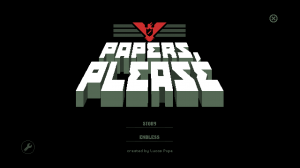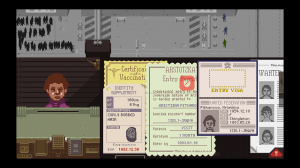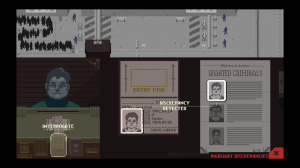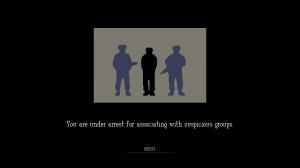
GAME GRADE: B+
“Papers, Please,” a downloadable video game from independent developer Lucas Pope and released via the Steam digital distribution service ($9.99) for PC, is a strange specimen of a game.
“Papers, Please” is a puzzle game, but it also features a rather engaging story told through interactions with characters and the environment that is the hallmark of the platform’s point-and-click adventure games famous in the 90’s. The game was released in Aug. 2013, but it looks like it came off an old Commodore 64 (but in a good way–the visuals are charming and gel well with the setting). Like a round peg in a square hole, “Papers, Please” refuses to fit the mold; but unlike the peg, “Papers, Please” is actually better because of it.
The game’s unique design is one of its greatest strengths. In a time when most retro-style games are content to simply ape the classics in aesthetics and gameplay (occasionally being nothing more than pale imitations of the games you could pull out of your attic), “Papers, Please” actually uses its influences and appearance to craft a wholly new and original experience. The combination of the game’s imaginative, entertaining framing of puzzle gameplay within an unorthodox setting creates an altogether compelling experience.
The game takes place in the 1980’s within the fictional nation of Arstotzka, a totalitarian hellhole in the vein of the former Eastern Bloc, with features like a secret police force, a labor lottery and human trafficking. The game puts the player in the shoes of a newly-minted border inspector, one of the most devilishly clever puzzle scenarios imaginable. The player is charged with deciding who can cross the border into the country. Armed only with a rule book and stamps (at least at first), the player must stand in their booth and… check paperwork. It doesn’t sound very stimulating, but is actually quite fun; the paperwork frame provides an excellent setup for a brain-teasing visual puzzle gameplay that is easy to grasp but difficult to master.

Gameplay revolves around checking the passports and assorted identification of people attempting to cross the border. Players must scrutinize the documents for errors and inconsistencies (the guidelines for which are located in the aforementioned rule book), then either deny or approve the person (or call the guards, if denial isn’t quite your speed). The discrepancies form the basis of the puzzles and give them their complexity. The difficulty is provided by a time limit (abstracted as a “day” in-game, which is roughly equivalent to a “level” in other video games), which forces players to strike a balance between examining each set of papers very closely (which means that players are forced to move slow, get less approvals per day and thus less points per day) and moving quickly (which runs the risk of getting improper approvals, which subtracts points).
The puzzle gameplay isn’t without fault, however. As fun as it can be, there’s always a feeling that your mistakes in-game are less a result of your own skill and more a result of the game pulling a fast one. For instance, in a game that relies on time limits, being able to work fast is key; so why do I have to put up with arbitrary cutoffs and delays (Move it already! I already denied you, stop with the chatter!)? I understand the story reason for these pauses, and they do provide breathers, but it’s still frustrating when the game conditions you to move as quickly as you can. The time delays are more excusable than the cheap shots in some of the puzzles, though. While having extremely subtle solutions to puzzles is fine, approving someone for entry and then seeing your points docked because you didn’t catch a spelling mistake strikes me as a bit excessive (not to mention hitting a bit too close to my newsroom home). Despite all this, these annoying parts are generally few and far between, so they won’t detrimentally impact a single playthrough of the game.

If “Papers, Please” had just been content with its puzzle gameplay and nothing else it would have been a good, but not terribly memorable, game. What really makes “Papers, Please” stand out is the way it combines gameplay with a minimally-intrusive but still engaging story. The points accrued at the end of each game day aren’t just left in a high score table, they’re counted between days and used as money to provide for the player character’s family, which lends emotional weight to the proceedings — taking your sweet time starts to become a bit less palatable when someone could starve if you don’t approve enough people during the day.
The start of each day is introduced with a newspaper clipping that might mention some of your actions from the previous day. People coming through the checkpoint might plead with you to let them through, make idle conversation or offer a side job to you. Though none of this affects the gameplay (except for the side jobs, which might net you a few more points and give a new twist to the puzzles in certain instances), these elements of the game succeed in building an engrossing setting and even establish a sort of endgame plot.
The story is impressive but chances are that playing though the game once won’t let you see most of it. “Papers, Please” has multiple endings, which certainly sounds like a good thing until you find out that you might end the game a third of the way through the story. Many of these endings are glorified game over screens and might be a bit of a letdown to receive (not to mention that some of them are big downers, story-wise). Still, the story interludes — which can range from helping a border guard smuggle his girlfriend into the country to quietly assisting a revolutionary group by passing along information to their agents coming across — provide plenty of replay value.

Getting an ending a third of the way through the game highlights another issue: it’s not very long. The game can be played from start-to-finish in a single evening — even going through the various endings won’t take much longer. But there is a silver lining to this shortness: the game doesn’t overstay its welcome. You never get stuck in a rut that you’ll find in more ambitious games, particularly big-name AAA releases. Sure, you might get more excitement playing “Grand Theft Auto V” in a given moment, but there won’t be any of the “So now what?” moments that you get when a game fails to pace and structure itself consistently.
“Papers, Please” is a great game that presents an engrossing story and enjoyable gameplay, but it isn’t perfect. The game is a bit on the short end and can occasionally provide more frustration than fun. At a $10 price point, however, it is more than worth the money and I would highly recommend it for anyone who enjoys puzzles, retro games, atmospheric stories or all of the above.
Call it a solid “B+”.







